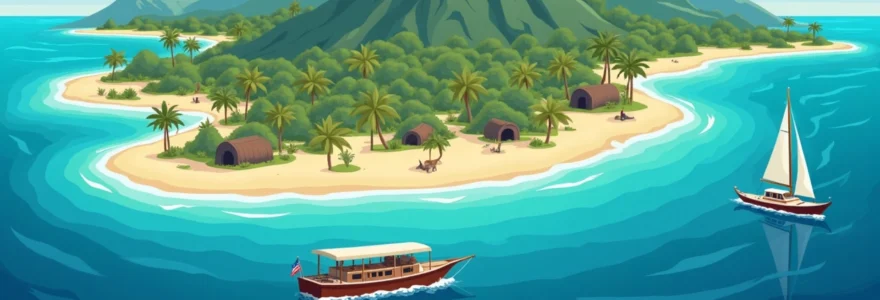Island hopping is the ultimate adventure for travellers seeking diverse experiences, breathtaking landscapes, and rich cultural immersion. This unique form of exploration allows you to discover multiple destinations in a single journey, each with its own distinct character and charm. From the sun-soaked beaches of the Caribbean to the ancient ruins of Greece, island hopping offers a kaleidoscope of experiences that will leave you with unforgettable memories and a deep appreciation for the world’s coastal wonders.
Archipelago exploration strategies for diverse island ecosystems
When embarking on an island-hopping adventure, it’s crucial to develop effective strategies for exploring diverse archipelagos. Each island chain presents its own unique ecosystems, from lush tropical rainforests to arid volcanic landscapes. To make the most of your journey, consider focusing on specific themes or interests, such as wildlife observation, geological formations, or cultural heritage sites.
One effective approach is to plan your itinerary based on the geographical layout of the archipelago. Start with the largest or most accessible island and work your way outwards, allowing you to gradually acclimate to the local environment and culture. This method also helps you optimize your travel time and resources, ensuring a more efficient exploration of the island chain.
Another strategy is to select islands that offer contrasting experiences. For example, in the Greek islands, you might combine the bustling nightlife of Mykonos with the serene beauty of Santorini, followed by the historical richness of Crete. This diversity will provide you with a well-rounded perspective of the archipelago’s offerings and keep your journey exciting and varied.
Nautical navigation techniques for Inter-Island travel
Mastering nautical navigation is essential for a successful island-hopping adventure, especially if you’re planning to navigate the waters yourself. Understanding the basics of maritime navigation will not only ensure your safety but also enhance your overall experience by allowing you to explore hidden coves and secluded beaches that may be inaccessible to larger vessels.
Gps-based route planning for optimal island sequences
Modern GPS technology has revolutionized island hopping, making it easier than ever to plan efficient routes between destinations. When using GPS for route planning, consider factors such as distance, prevailing winds, and potential stopping points for rest or refueling. Many marine GPS systems also provide information on underwater topography, which can be crucial for avoiding shallow areas and navigating through coral reefs.
Tidal pattern analysis for safe island approaches
Understanding tidal patterns is crucial for safe navigation, especially when approaching islands with shallow harbors or coral-fringed coastlines. Tidal charts and almanacs provide essential information on high and low tide times, as well as the direction and strength of tidal currents. This knowledge allows you to time your arrivals and departures for optimal conditions, reducing the risk of running aground or encountering strong currents.
Wind direction utilisation in sailboat island hopping
For those exploring by sailboat, harnessing the power of the wind is key to efficient island hopping. Study prevailing wind patterns in your chosen archipelago and plan your route to take advantage of favorable winds. This not only saves fuel but also provides a more authentic and enjoyable sailing experience. Remember that wind patterns can vary seasonally, so adjust your itinerary accordingly to make the most of the conditions.
Anchoring techniques for varied island topographies
Each island you visit may present different anchoring challenges, from sandy bottoms to coral reefs. Mastering various anchoring techniques ensures you can safely moor your vessel in diverse conditions. For coral areas, use a mooring buoy whenever available to protect the delicate ecosystem. In deeper waters, consider using a two-anchor system for added stability, especially if you plan to stay overnight.
Cultural immersion through Multi-Island itineraries
One of the most rewarding aspects of island hopping is the opportunity for deep cultural immersion across multiple destinations. Each island often has its own unique traditions, dialects, and way of life, offering you a rich tapestry of experiences to explore and learn from.
Linguistic diversity across greek cyclades islands
The Greek Cyclades islands offer a fascinating study in linguistic diversity. While Modern Greek is spoken throughout, you’ll encounter distinct dialects and accents as you hop from island to island. On Naxos, for example, you might hear traces of ancient Arvanitika, while on Santorini, the local dialect has been influenced by the island’s volcanic history and maritime traditions.
Gastronomic tours of indonesia’s spice islands
Indonesia’s famed Spice Islands, including Maluku and North Maluku, offer a culinary journey through history. As you island hop, you’ll discover how each island’s unique blend of spices has shaped its cuisine. From the nutmeg-infused dishes of Banda to the clove-rich recipes of Ternate, every meal becomes a lesson in cultural and culinary heritage.
Traditional craftsmanship preservation in philippine visayas
The Visayas region of the Philippines is a treasure trove of traditional craftsmanship. As you explore islands like Cebu, Bohol, and Panay, you’ll encounter artisans preserving ancient techniques in weaving, pottery, and woodcarving. Engage with local communities to learn about their efforts to keep these traditions alive in the face of modernization.
Polynesian navigation heritage in hawaiian islands
Island hopping in Hawaii offers a unique opportunity to delve into the rich heritage of Polynesian navigation. Visit cultural centers on different islands to learn about the ancient wayfinding techniques that allowed Polynesians to traverse vast oceanic distances. You might even have the chance to participate in a traditional outrigger canoe voyage, experiencing firsthand the connection between Hawaiian culture and the sea.
Ecological conservation challenges in island biodiversity hotspots
Island ecosystems are often biodiversity hotspots, home to unique species and delicate ecological balances. However, these environments face numerous conservation challenges, from climate change to invasive species. As an island hopper, you have the opportunity to witness these issues firsthand and potentially contribute to conservation efforts.
Many islands are implementing innovative conservation strategies to protect their unique flora and fauna. For example, in the Galápagos Islands, strict visitor regulations and habitat restoration projects aim to preserve the archipelago’s extraordinary biodiversity. Similarly, the Seychelles has pioneered marine protected areas to safeguard its coral reefs and marine life.
As you travel between islands, you’ll gain a deeper understanding of the interconnectedness of island ecosystems and the global implications of their conservation. This awareness can inspire you to become an advocate for island conservation long after your journey has ended.
Economic impact of island tourism on local communities
Island hopping tourism can have a significant economic impact on local communities, bringing both opportunities and challenges. Understanding these dynamics can help you make more informed and responsible choices during your travels.
Sustainable tourism models in galápagos islands
The Galápagos Islands have become a model for sustainable tourism, balancing economic benefits with environmental protection. The archipelago’s strict visitor management system and emphasis on eco-friendly accommodations demonstrate how tourism can support conservation efforts while providing economic opportunities for local communities.
Artisanal fishing preservation in azores archipelago
In the Azores, efforts are underway to preserve traditional artisanal fishing practices while developing sustainable tourism. By participating in responsible fishing tours or dining at restaurants that source locally caught fish, you can support these initiatives and help maintain the islands’ cultural heritage.
Eco-lodge development in seychelles islands
The Seychelles has embraced eco-lodge development as a way to promote sustainable tourism. These eco-friendly accommodations not only minimize environmental impact but also provide employment and economic benefits to local communities. Staying at an eco-lodge during your island-hopping adventure allows you to directly contribute to these sustainable development efforts.
Traditional agriculture revitalisation in caribbean islands
Many Caribbean islands are revitalizing traditional agricultural practices as a way to diversify their economies and reduce reliance on tourism. By visiting local farms, participating in agritourism activities, or purchasing locally grown products, you can support these initiatives and help preserve the islands’ agricultural heritage.
Logistical planning for Multi-Island adventures
Effective logistical planning is crucial for a smooth and enjoyable island-hopping experience. Consider factors such as transportation options between islands, accommodation availability, and seasonal weather patterns when crafting your itinerary.
Research inter-island ferry schedules and domestic flight options well in advance, as services can be limited on some routes. It’s often wise to book accommodations ahead of time, especially during peak tourist seasons or on smaller islands with limited options.
Pack strategically, considering the varied activities and climates you might encounter. Lightweight, quick-drying clothing, sturdy water shoes, and a reliable daypack are essential items for most island-hopping adventures.
Finally, be flexible in your plans. Island life often moves at its own pace, and unexpected changes in weather or transportation can occur. Embracing these uncertainties as part of the adventure will enhance your overall experience and allow you to fully immerse yourself in the laid-back island atmosphere.
By incorporating island hopping into your travel bucket list, you open yourself up to a world of diverse experiences, cultural encounters, and natural wonders. Whether you’re sailing through the Greek Isles, exploring the biodiversity of the Galápagos, or island-hopping in the South Pacific, each journey promises unique insights and unforgettable memories. So pack your sense of adventure, respect for local cultures and environments, and get ready to embark on the ultimate island-hopping odyssey.


